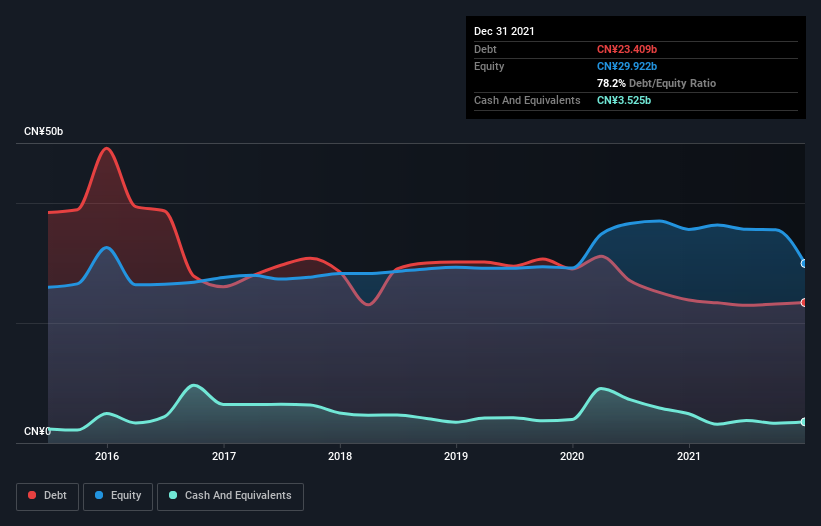- Hong Kong
- /
- Oil and Gas
- /
- SEHK:1138
Does COSCO SHIPPING Energy Transportation (HKG:1138) Have A Healthy Balance Sheet?

The external fund manager backed by Berkshire Hathaway's Charlie Munger, Li Lu, makes no bones about it when he says 'The biggest investment risk is not the volatility of prices, but whether you will suffer a permanent loss of capital.' It's only natural to consider a company's balance sheet when you examine how risky it is, since debt is often involved when a business collapses. We note that COSCO SHIPPING Energy Transportation Co., Ltd. (HKG:1138) does have debt on its balance sheet. But should shareholders be worried about its use of debt?
When Is Debt Dangerous?
Debt assists a business until the business has trouble paying it off, either with new capital or with free cash flow. If things get really bad, the lenders can take control of the business. However, a more common (but still painful) scenario is that it has to raise new equity capital at a low price, thus permanently diluting shareholders. By replacing dilution, though, debt can be an extremely good tool for businesses that need capital to invest in growth at high rates of return. When we examine debt levels, we first consider both cash and debt levels, together.
View our latest analysis for COSCO SHIPPING Energy Transportation
What Is COSCO SHIPPING Energy Transportation's Debt?
The chart below, which you can click on for greater detail, shows that COSCO SHIPPING Energy Transportation had CN¥23.4b in debt in December 2021; about the same as the year before. However, it also had CN¥3.52b in cash, and so its net debt is CN¥19.9b.

How Strong Is COSCO SHIPPING Energy Transportation's Balance Sheet?
We can see from the most recent balance sheet that COSCO SHIPPING Energy Transportation had liabilities of CN¥13.3b falling due within a year, and liabilities of CN¥16.1b due beyond that. Offsetting these obligations, it had cash of CN¥3.52b as well as receivables valued at CN¥1.41b due within 12 months. So it has liabilities totalling CN¥24.5b more than its cash and near-term receivables, combined.
This deficit is considerable relative to its market capitalization of CN¥31.9b, so it does suggest shareholders should keep an eye on COSCO SHIPPING Energy Transportation's use of debt. Should its lenders demand that it shore up the balance sheet, shareholders would likely face severe dilution.
We use two main ratios to inform us about debt levels relative to earnings. The first is net debt divided by earnings before interest, tax, depreciation, and amortization (EBITDA), while the second is how many times its earnings before interest and tax (EBIT) covers its interest expense (or its interest cover, for short). This way, we consider both the absolute quantum of the debt, as well as the interest rates paid on it.
As it happens COSCO SHIPPING Energy Transportation has a fairly concerning net debt to EBITDA ratio of 7.1 but very strong interest coverage of 1k. This means that unless the company has access to very cheap debt, that interest expense will likely grow in the future. Importantly, COSCO SHIPPING Energy Transportation's EBIT fell a jaw-dropping 94% in the last twelve months. If that earnings trend continues then paying off its debt will be about as easy as herding cats on to a roller coaster. When analysing debt levels, the balance sheet is the obvious place to start. But it is future earnings, more than anything, that will determine COSCO SHIPPING Energy Transportation's ability to maintain a healthy balance sheet going forward. So if you want to see what the professionals think, you might find this free report on analyst profit forecasts to be interesting.
Finally, a company can only pay off debt with cold hard cash, not accounting profits. So the logical step is to look at the proportion of that EBIT that is matched by actual free cash flow. Happily for any shareholders, COSCO SHIPPING Energy Transportation actually produced more free cash flow than EBIT over the last three years. There's nothing better than incoming cash when it comes to staying in your lenders' good graces.
Our View
We feel some trepidation about COSCO SHIPPING Energy Transportation's difficulty EBIT growth rate, but we've got positives to focus on, too. To wit both its interest cover and conversion of EBIT to free cash flow were encouraging signs. Taking the abovementioned factors together we do think COSCO SHIPPING Energy Transportation's debt poses some risks to the business. So while that leverage does boost returns on equity, we wouldn't really want to see it increase from here. There's no doubt that we learn most about debt from the balance sheet. But ultimately, every company can contain risks that exist outside of the balance sheet. We've identified 2 warning signs with COSCO SHIPPING Energy Transportation (at least 1 which shouldn't be ignored) , and understanding them should be part of your investment process.
At the end of the day, it's often better to focus on companies that are free from net debt. You can access our special list of such companies (all with a track record of profit growth). It's free.
New: AI Stock Screener & Alerts
Our new AI Stock Screener scans the market every day to uncover opportunities.
• Dividend Powerhouses (3%+ Yield)
• Undervalued Small Caps with Insider Buying
• High growth Tech and AI Companies
Or build your own from over 50 metrics.
Have feedback on this article? Concerned about the content? Get in touch with us directly. Alternatively, email editorial-team (at) simplywallst.com.
This article by Simply Wall St is general in nature. We provide commentary based on historical data and analyst forecasts only using an unbiased methodology and our articles are not intended to be financial advice. It does not constitute a recommendation to buy or sell any stock, and does not take account of your objectives, or your financial situation. We aim to bring you long-term focused analysis driven by fundamental data. Note that our analysis may not factor in the latest price-sensitive company announcements or qualitative material. Simply Wall St has no position in any stocks mentioned.
About SEHK:1138
COSCO SHIPPING Energy Transportation
An investment holding company, engages in the shipment of oil, liquefied natural gas (LNG), and chemicals along the coast of the People’s Republic of China and internationally.
Adequate balance sheet and fair value.


